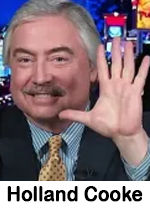By Holland Cooke
Consultant

Listeners now expect what-they-want when-they-want-it. And advertisers want their attention wherever they can get it. So, yes, archiving on-air programming for on-demand consumption has value. Respecting how scarce attention is, this tip: In addition to whole-hour airchecks, offer short, single-topic show excerpts, and title them as obviously as possible. Don’t expect listeners to click-click-click through or sit-through an hour-long aircheck for three great minutes about “How to keep Alexa from spying on you.” So post-and-Tweet that. Otherwise, understand how broadcasting and podcasting are cousins, not siblings.
How podcasting is unlike radio: AM/FM broadcasters’ content is mass-appeal, and locally-oriented. But the best podcast topics are “narrowcast” stuff. And you’re on what we used to call “the Worldwide Web.” So going real narrow is opportune. Example?
Do a podcast about gardening, and you’ll get lost-in-the-weeds. Do one about growing vegetables year-round in a vertical hydroponic garden in a closet and you’ll click.
How successful podcasts are like radio: You’re asking for attention. And with so much competition for it now, that’s a big ask.
That’s where professional broadcasters have an advantage over amateurish podcasters. Best practices that radio has spent 100 years proving are techniques that can earn you habitual listening.
More, including what TALKERS publisher Michael Harrison considers the #1 success factor in podcasting, here: http://getonthenet.com/podcasting.html
Holland Cooke (HollandCooke.com) is a consultant working the intersection of broadcasting and the Internet. He is the author of “The Local Radio Advantage: Your 4-Week Tune-In Tune-Up” and “Close Like Crazy: Local Direct Leads, Pitches & Specs That Earned the Benjamins” and “Confidential: Negotiation Checklist for Weekend Talk Radio.” Follow HC on Twitter @HollandCooke and connect on LinkedIn.



